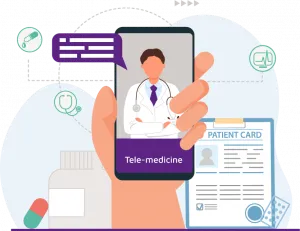General Physician | 5 min read
Everything you need to know about telemedicine
Medically reviewed by
Table of Content
Key Takeaways
- what is telemedicine? Is it different from telehealth?
- Telemedicine enables virtual consultations and make remote care a provision that everyone can rely on.
- Telemedicine will continue to grow, but there will be need for intervention on a case-to-case basis
Innovations in healthcare have begun to ramp up over the last couple of years, and the world is now better for it. Given the impact of the pandemic on this sector, any new infrastructure that simplifies accessibility and treatment is welcomed. This may be one of the reasons why telemedicine services have become increasingly popular today. In fact, it is now the preferred route for many as it minimises the chance of exposure to the virus.
But, what is telemedicine? Is it different from telehealth? What are its advantages, if any? For the answers to all these important questions and to gain clarity on its value in today’s scenario, take a look these points.
What is telemedicine?
According to the World Health Organization (WHO), telemedicine is, “the delivery of healthcare services, where distance is a critical factor, by all healthcare professionals using information and communication technologies for the exchange of valid information for the diagnosis, treatment and prevention of disease and injuries, research and evaluation, and for the continuing education of healthcare providers, all in the interests of advancing the health of individuals and their communities.”
Additional Read: How Does Telemedicine Help You Receive Medical Treatment Remotely?
All this means is that electronic communication will now play a major role in the exchange of medical information toward bettering an individual’s health. In today’s world, this is a reality because it is easier to access faster internet with devices that are facilitate wireless connectivity. These enable virtual consultations and make remote care a provision that everyone can rely on.
Additional Read: What is General Physician?What are the advantages of telemedicine?
In principle, telemedicine is the ideal solution for any and all remote care needs. As such, it is immensely beneficial to those in need in comparison to traditional healthcare provisions. However, despite its accessibility and flexibility, it is unwise to think that telemedicine is a complete solution to the shortcomings of the healthcare sector.
Though telemedicine has its limitations, it also bridges several gaps that hinder the existing healthcare infrastructure. To shed some light on this, here are a few advantages of telemedicine.
- Telemedicine reduces the need for travel. This saves time and makes it much easier for patients to access care in a timely manner.
- Telemedicine helps patients maintain follow-up appointments and decreases cancellations. As such, healthcare professionals see an improvement in treatment outcomes and an increase in revenues.
- Telemedicine enables cross consultation. For individuals who rely on family doctors, a specialist’s medical opinion can be immensely beneficial. Telemedicine provisions encourage this practice, which ultimately results in a higher standard of care.
- Telemedicine makes healthcare accessible to rural areas of the country where medical care isn’t attainable or where underdeveloped infrastructure poses problems. Telemedicine thus eliminates the problem faced by both the afflicted as well as the medical practitioner.
- Telemedicine services provide a higher level of safety during a pandemic. Due to its reliance on electronic communication, telemedicine helps keep cross infection in control. In fact, this advantage is particularly relevant to those with suppressed or weakened immune systems as a physical clinic visit could be detrimental.
- Telemedicine helps the disabled, chronically-ill and elderly gain easy access to medical care.
- Telemedicine provisions can ensure timely preventive care services. As such, this can help communities stay healthier for longer.
- Telemedicine enables remote monitoring and patient engagement. This is particularly important for those suffering from lifestyle diseases and chronic health conditions. It improves the patient’s health proactively while still cutting the medical costs.
Are there different types of telemedicine services?
There 3 main types of telemedicine services, which are as follows.
- Interactive Medicine: This enables patients and physicians to communicate in real-time. Here, consultations may be conducted over the phone or via video call. This involves an assessment of the medical history, psychiatric evaluations and more, as needed.
- Store and Forward Telemedicine: This improves medication management and reduces redundancies and repeat testing. Here, providers share patient information with a specialists in another location by digitally transferring patient records.
- Remote Patient Monitoring Telemedicine: This provides medical care to areas with no other means of healthcare. Here, practitioners monitor their patients with help of medical devices. These transmit crucial patient data such as vital signs to specialists so that treatment can be administered as needed.
What is the difference between telemedicine and telehealth?
The debate over the difference between telemedicine and telehealth mainly stems from the difference in their definitions. As mentioned earlier, telemedicine is simply the vehicle through which healthcare is made accessible to the public. On the other hand, telehealth covers non-clinical events, which include:
- General health services
- Administrative meetings
- Public health services
- Continuing medical education (CME)
- Physician training
Telemedicine in India
Due to the pandemic, India, like many other countries, has developed a regulatory framework for the telemedicine. It is among the top 10 countries for its telemedicine provisions in the world. The GOI put forth guidelines on 25th March, 2020, enabling Registered Medical Practitioners (RMP) to administer treatment and healthcare using telemedicine. As such, the telemedicine market in the country has experienced considerable growth and is now set to cross $5.5Bn by 2025.

COVID-19 has urged many to seek out telemedicine as it offers care in a safer way. Telemedicine will continue to grow, but there will be need for intervention on a case-to-case basis. The importance and relevance of a physical check-up can’t and shouldn’t be denied. However, for the cases that can reliably get the needed care via telemedicine, it is an ideal provision.
Additional Read: Becosules Capsule (Z): Uses, Composition, Benefits and SyrupFind the best doctor for your need on Bajaj Finserv Health. Locate a doctor near you in minutes. View doctors’ years of experience, consulting hours, fees and more before booking an e-consult or in-person appointment. Apart from facilitating appointment booking, Bajaj Finserv Health also offers health plans for your family, medicine reminders, healthcare information and discounts from select hospitals and clinics.
References
Disclaimer
Please note that this article is solely meant for informational purposes and Bajaj Finserv Health Limited (“BFHL”) does not shoulder any responsibility of the views/advice/information expressed/given by the writer/reviewer/originator. This article should not be considered as a substitute for any medical advice, diagnosis or treatment. Always consult with your trusted physician/qualified healthcare professional to evaluate your medical condition. The above article has been reviewed by a qualified doctor and BFHL is not responsible for any damages for any information or services provided by any third party.





